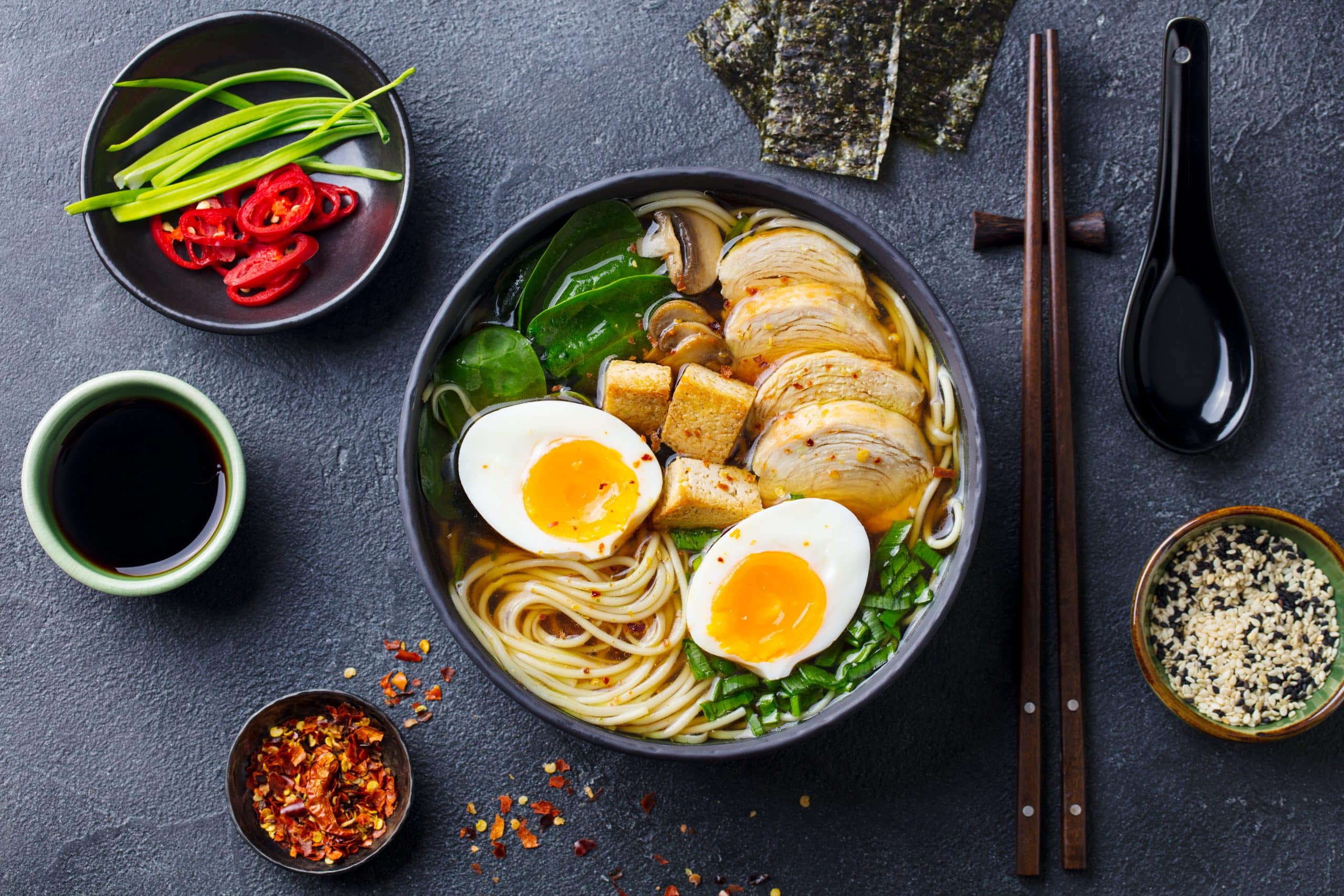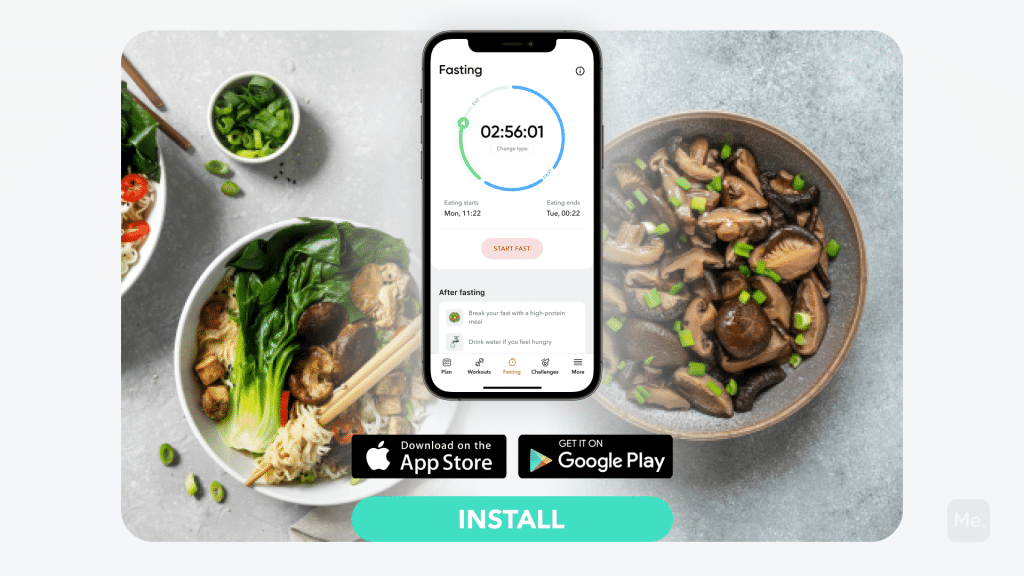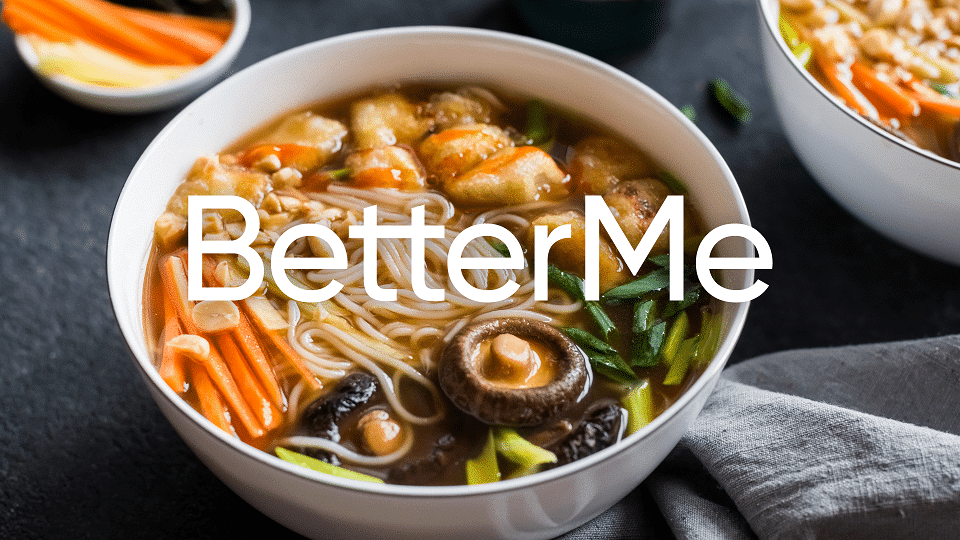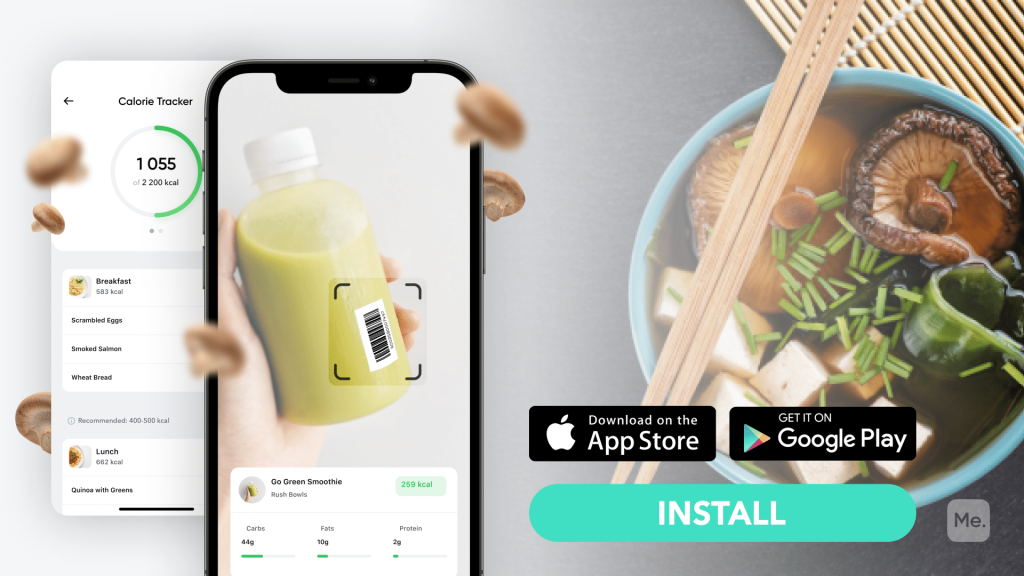Ramen is a type of Japanese noodle dish that is traditionally made with wheat noodles and broth. It can also be made with rice noodles and is commonly served with a variety of toppings, such as vegetables, meat, or fish. Instant ramen is the cheaper, mass-produced version of this dish that is typically sold in packages and only requires the addition of water to prepare. So when you’re pressed for time and money, it may be the first thing that comes to mind as a quick and easy meal. But if you’re also trying to lose weight, you might wonder if eating ramen will help or hinder your efforts. This article provides an evidence-based answer to the question, “Can you lose weight by eating ramen?”
Get your personalized
meal plan!
Is Instant Ramen Good For Weight Loss?
While instant ramen may be an affordable and easy meal option, it is not the best choice if you’re trying to lose weight. This is because it is high in calories, fat, sodium, and carbs, and it is lacking in fiber and protein.
Below are all the reasons why eating ramen noodles is not conducive to weight loss.
1. Ramen Noodles Are High In Calories
A single package of ramen noodles contains about 384 calories (4). And when you add in the sodium-rich seasoning packet and any additional toppings, the calorie count goes up even more.
If you’re trying to lose weight, you need to be in a calorie deficit, which means eating fewer calories than you burn. And when most of those calories come from ramen noodles, it’s going to be very difficult to create a calorie deficit and lose weight while getting the nutrients you need.
2. Ramen Noodles Are High In Fat
Fat is good for you when it comes from healthy sources like avocados and olive oil, but the fat in ramen noodles is not the healthy kind. In fact, a single package of ramen noodles contains about 15 grams of fat, nearly half of which is from unhealthy saturated fats (4).
Saturated fats can contribute to increased LDL (“bad”) cholesterol levels which in turn increase the risk for heart disease (13). So if you’re trying to lose weight and improve your health, it’s best to avoid foods that are high in saturated fat like ramen noodles.
3. Ramen Noodles Are High In Sodium
A high-sodium diet can contribute to a variety of health problems like high blood pressure, which increases the risk for stroke and heart disease (6). And a single package of ramen noodles contains about 1/3 of the daily recommended intake for sodium.
Eating too much sodium can also contribute to water retention, which can make you feel bloated and heavier than you actually are (12).
4. Ramen Noodles Are High In Simple Carbs
Simple carbs have a bad rap in weight loss circles for several reasons; they can cause quicker spikes in blood sugar/energy levels, they’re often high in calories, and they’re not very filling (5). Eating them can trigger cravings for more simple carbs and make it hard to stick to your weight loss goals.
Some brands of ramen noodles do contain complex carbs like whole wheat, but most instant varieties are made with simple carbs like enriched white flour. This means that they won’t do you any favors when it comes to weight loss.
5. Ramen Noodles Lack Fiber And Protein
Ramen noodles are very low in fiber and protein, two nutrients that are essential for weight loss. Fiber helps you feel full after eating so that you’re less likely to overeat, and protein helps build muscle mass, which burns more calories than fat (8) (9).
A lack of fiber and protein can also lead to faster spikes and dips in blood sugar levels, which as we mentioned before, might trigger cravings for more simple carbs.
Read More: Kimchi Diet: Health & Weight Loss Benefits And Risks
6. Ramen Noodles May Contain Unhealthy Additives
In addition to being high in calories, fat, sodium, and carbs, ramen noodles may also contain unhealthy additives.
One such additive is Tertiary-butylhydroquinone (TBHQ), which is a preservative that can be harmful in large amounts over a long period of time (2). Research into the effects of TBHQ is limited, but it has been linked to stomach issues like nausea and vomiting (1). However the doses that might be harmful are much higher than anyone would get from eating ramen or other foods. TBHQ is safe to consume in the amounts allowed in foods by food safety authorities.
Another additive that may be present in ramen noodles is msg (monosodium glutamate). Some people are sensitive to msg and may experience symptoms like headaches, sweating, and chest pain after eating it (3).
This additive is linked to “Chinese restaurant syndrome,” although the jury is still out on whether or not it actually causes these symptoms (7).
7. Ramen Noodles Are Often Eaten In Unhealthy Ways
Ramen noodles are often consumed as part of an unhealthy diet. For example, they’re often eaten as a late-night snack or as a meal replacement when someone is trying to save money.
Eating ramen noodles as a late-night snack can lead to weight gain because it’s easy to overeat when you’re tired (14). And eating them as a meal replacement can also backfire because they don’t contain the nutrients that your body needs to function properly.
How To Make Ramen Noodles Healthier
As part of a healthy diet, ramen noodles can be an occasional indulgence. But if you’re trying to lose weight, there are a few things you can do to make them healthier.
1. Use Whole Wheat Noodles
If possible, choose whole wheat noodles over white noodles. Whole wheat noodles have more fiber, which can help you feel full and may aid in weight loss (10).
2. Limit The Packets Of Seasoning
Each packet of ramen seasoning is high in sodium and calories. If you’re trying to lose weight, it’s best to limit the packets or find a low-sodium alternative.
Low-sodium soy sauce, low-sodium broth, and spices like ginger, garlic, and onion can all add flavor to your ramen without the extra sodium.
BetterMe app is a foolproof way to go from zero to a weight loss hero in a safe and sustainable way! What are you waiting for? Start transforming your body now!
3. Add Vegetables
Ramen noodles are often lacking in nutrients, so it’s important to add some veggies to your bowl. Broccoli, carrots, peas, and spinach are all good choices. You can also add protein-rich toppings like eggs or tofu.
4. Make Your Own Broth
Traditional Japanese ramen has one of four types of broth; shio (salt), shoyu (soy sauce), miso (fermented soybean paste), or tonkotsu (pork marrow) (11). The problem with these broth types is that they are all high in sodium.
Making your own broth at home is a much healthier alternative. You can use chicken, beef, or vegetable broth as a base and add your own seasonings. This will help you control the sodium content and make a healthier soup.
Miso, a fermented soybean paste, is a popular flavoring for ramen. It’s also a good source of protein, vitamins, and minerals. If you’re trying to lose weight, choose a light miso or make your own with less salt.
5. Avoid The Deep-Fried Noodles
Some varieties of ramen noodles are deep-fried, which makes them high in calories and unhealthy. If you’re trying to lose weight, avoid these noodles and choose a healthier option.
6. Watch Your Portions
Ramen noodles are small, so it’s easy to eat too many of them. If you’re trying to lose weight, be mindful of your portion size and limit yourself to one or two servings.
7. Choose Healthy Toppings
Ramen is often topped with things like pork, eggs, and cheese, which can add calories and fat to your meal. If you’re trying to lose weight, choose healthy toppings like vegetables, tofu, or lean meat. You can also skip the toppings altogether and enjoy a simple bowl of noodles.
8. Drink Plenty Of Water
Ramen noodles are high in sodium, which can cause you to retain water. If you’re trying to lose weight, be sure to drink plenty of water throughout the day to stay hydrated and help your body flush out the excess sodium (15).
Read More: Carnivore Diet: Is This Meat-Based Diet Healthy Or Extreme?
The Bottom Line
Ramen noodles are a quick and easy meal, but they’re not the healthiest option. If you’re trying to lose weight, there are a few things you can do to make them healthier.
Choose whole wheat noodles, limit the packets of seasoning, add vegetables, make your own broth, avoid deep-fried noodles, watch your portions, and choose healthy toppings. Drinking plenty of water is also important.
By making a few simple changes, you can enjoy ramen as part of a healthy diet. Just be sure to limit your intake and make healthier choices when possible.
DISCLAIMER:
This article is intended for general informational purposes only and does not serve to address individual circumstances. It is not a substitute for professional advice or help and should not be relied on for making any kind of decision-making. Any action taken as a direct or indirect result of the information in this article is entirely at your own risk and is your sole responsibility.
BetterMe, its content staff, and its medical advisors accept no responsibility for inaccuracies, errors, misstatements, inconsistencies, or omissions and specifically disclaim any liability, loss or risk, personal, professional or otherwise, which may be incurred as a consequence, directly or indirectly, of the use and/or application of any content.
You should always seek the advice of your physician or other qualified health provider with any questions you may have regarding a medical condition or your specific situation. Never disregard professional medical advice or delay seeking it because of BetterMe content. If you suspect or think you may have a medical emergency, call your doctor.
SOURCES:
- 3 Final Report on the Safety Assessment of t-Butyl Hydroquinone (1986, journals.sagepub.com)
- Alarming impact of the excessive use of tert-butylhydroquinone in food products: A narrative review (2022, sciencedirect.com)
- A review of the alleged health hazards of monosodium glutamate (2019, ncbi.nlm.nih.gov)
- Calories in Ramen Noodle (n.d., nutritionix.com)
- Carbohydrates and Blood Sugar (n.d., hsph.harvard.edu)
- Cardiovascular and other effects of salt consumption (2013, ncbi.nlm.nih.gov)
- Chinese Restaurant Syndrome (2017, ncbi.nlm.nih.gov)
- Dietary fat, fibre, satiation, and satiety—a systematic review of acute studies (2018, nature.com)
- Dietary Protein and Muscle Mass: Translating Science to Application and Health Benefit (2019, mdpi.com)
- Fiber Intake Predicts Weight Loss and Dietary Adherence in Adults Consuming Calorie-Restricted Diets: The POUNDS Lost (Preventing Overweight Using Novel Dietary Strategies) Study (2019, academic.oup.com)
- Four Main Types of Ramen (2021, bokksu.com)
- Increased salt consumption induces body water conservation and decreases fluid intake (2017, ncbi.nlm.nih.gov)
- The Evidence for Saturated Fat and for Sugar Related to Coronary Heart Disease (2015, ncbi.nlm.nih.gov)
- The Health Impact of Nighttime Eating: Old and New Perspectives (2015, mdpi.com)
- The impact of water intake on energy intake and weight status: a systematic review (2011, ncbi.nlm.nih.gov)










